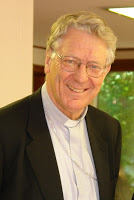
In a letter to the priests, deacons and pastoral workers in his diocese – in other words, everyone entrusted with the pastoral care of the faithful – Ghent’s Bishop Luc Van Looy joins the ranks of Synod fathers looking back on the past three weeks. Bishop Van Looy does so not only as a diocesan bishop, but also as President of Caritas Europe. This focus already became clear inthe first of two interventions he made at the Synod, when he spoke about the plight of migrants and refugees.

^Bishop Van Looy (right) shakes hands with Cardinal Marx at the Synod. Photo credit: CNS
In this letter, Bishop Van Looy focusses on the three steps of listening, accompanying and integration when it comes to exercising mercy.
I must add that his focus on a new beginning, or that the time of condemnation and judging is over, seems to indicate a rupture with the past that simply is not there. The Synod did not go about inventing a new Church, but making the existing one more effective in her pastoral care. Too often I see this false opposition between doctrine (the past) and mercy (the future), or doctrine and reality. Sure, we can well speak of a renewed focus on mercy, of new ways of exercising pastoral care, but not without starting from the foundation that is there. Mercy is not complete without doctrine.
Anyway, on to the letter, which does reflect Bishop Van Looy’s enthusiasm about what was discussed and decided at the Synod.
To the priests, deacons and parish assistants of the Diocese of Ghent
Dear friends,
As you know, I participated in the Synod on The Vocation and the Mission of the Family in the Church and the World of Today. It has been a remarkable experience of being Church, a true Church council. The attention of media from all over the world confirms that this Synod was of special significance.
Rightly there has been talk of the “tenderness of the Church”: she is mother and the Pope is father.
The atmosphere of friendship and shared responsibility which existed among the 270 cardinals and bishops, the 40 lay people and the 20 representatives of other Christian churches and 10 religious made a true impression. Not only were the continents together, almost all countries in the world frankly made their voices heard. This gave us the opportunity to listen to the great variety of traditions and customs in marriage. The cry of distress to give the millions of people living in refugee camps and shelters, or in precarious situations anywhere in the world a future in which they can live as a family in serenity and human dignity and can assure the education of their children, sounded strongly at the Synod.
The Church has taken an important step forward towards cooperation and shared responsibility. The Church we experienced there is new and provides a well-founded hope for the future. Cardinal Danneels said, “The Church has changed”, and Pope Francis said that “the pyramid is turned upside down”. Synodically speaking, much work remains in the local churches, in the regional structures such as bishops’ conferences and also centrally in Rome. The right attitude is mercy understood and listening, and “listening is more than hearing”. That is always the starting point, followed by “accompanying”, recognising the real situation in which every family finds itself, and lastly working for “integration” in the Church. All baptised are members of the Church, divorced and remarried couples are also welcome, no one is excommunicated.
In the parable the father invited both his sons at the table, the prodigal son and also the oldest son, both sinners if you will. This image clearly expresses what mercy means. The good Samaritan did not ask if the wounded man was a Jew or Greek, married or divorced. These images indicate that man was at the heart of the Synod, in his or her real context, not theory or doctrine.
What is expected of the Church and the bishops? That they are close to the people and speak with them. That they take on “the smell of the sheep” and so find out what God’s Spirit plans for them. Discernment of the Spirit, together with mercy, could be called the keyword of what the Church is to do.
It was rightly said that the time when the Church was out to judge or condemn is over. The Synod shows a new image of the Church. People in difficult situations are invited to “a greater and also more complete participation in the life of the Church. Growing towards that is the goal of the pastoral guidance offered to them” (final document, nr. 86).
The influence of Pope Francis is great in such an assembly. Even though he says nothing in the general assembly, his sympathetic and available presence shows a new image of leadership. His opening homily, the address at the 50th anniversary of the Synod, his speech after the voting and his homily at the final Eucharist showed that he wants to be a humble servant who does however state calmly but clearly that service to the people, in the first place to the poor, comes first. Every authoritarian attitude is alien to him, and he rejects it.
“We walked like the disciples of Emmaus and have recognised the presence of Christ in the breaking of the bread in the Eucharist, in fraternal communion, in the discussion of pastoral experiences” (final document, nr. 94).
I wanted to share this with you, and entrust this to your care. The past weeks did not only mark those present, they are also an assignment for us all. Together, we continue working on it.
With best regards,
+ Luc Van Looy
 Salesians against the cyber-bullying
Salesians against the cyber-bullying
 Korea - Seoul Br. Marino
Korea - Seoul Br. Marino

































